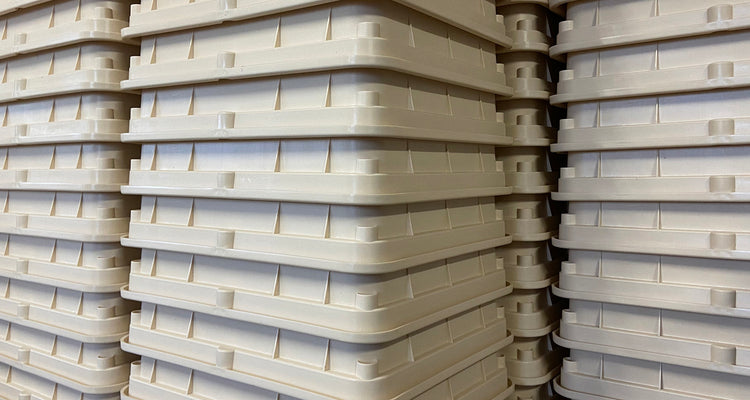
Hydroponic Buckets for Efficient, Soil-Free Growing Solutions
Types of Hydroponic Buckets
- Deep Water Culture Buckets: The DWC buckets suspend plants in net pots with roots submerged in nutrient-rich water. An air pump supplies oxygen, making it ideal for leafy greens and fast-growing herbs.
- Recirculating DWC Systems: This setup connects multiple DWC buckets to a shared reservoir, ensuring balanced nutrients across plants and simplifying maintenance for larger plants.
- Wick System Buckets: Wick buckets rely on capillary action to deliver nutrients to the roots. They are power-free systems suitable for small herbs or low-maintenance plants.
- Drip Bucket Systems: A drip line delivers nutrients directly to each plant’s base, offering precision control. This method is well-suited for fruiting plants or mixed-crop setups.
How to Choose the Right Hydroponic Bucket for Gardening?
Go for Opaque Hydroponic Buckets
Light exposure inside the bucket allows algae growth, which competes with your plants for nutrients and oxygen. Opaque, especially black or dark-colored buckets, keep the root zone clean and healthy.
Get the Right Hydroponic Bucket Size
The size of the buckets will determine what you can and can't grow. Smaller buckets dry out quickly and stress the roots. A 5-gallon or 8-gallon hydroponic bucket provides enough room for root expansion, which is best for growing cannabis, tomatoes, and peppers.
Check for System Compatibility
Ensure the bucket works with net pot lids, airline tubing, and air stones. Pre-drilled lids and buckets simplify setup for DWC systems.
FAQs - Hydroponic Buckets
Tap water can be used, but it is best to check for chlorine, chloramine, and high mineral content. Letting it sit for 24 hours or using a filter can help.
It is ideal to change the water every 1 to 2 weeks to maintain nutrient balance, reduce salt buildup, and prevent pathogens.
Yes, in systems like DWC (Deep Water Culture), a bubbler or air stone is crucial to provide oxygen to the roots.
Yes, 5-gallon buckets are a popular, safe, and affordable option for home hydroponics when made from food-safe plastic.
You can use plastic buckets, net pots, or grow trays, but make sure that they are non-toxic and opaque to limit algae growth.
No, traditional soil fertilizers are not balanced for hydroponic systems. Use nutrients specifically formulated for hydroponics.
Look for plastics labeled HDPE, LDPE, or PP. They are considered safe, especially when marked food-grade.
Yes, flushing helps remove salt buildup and prevent nutrient lockout. You should do it every few weeks or after cleaning between crop cycles.








